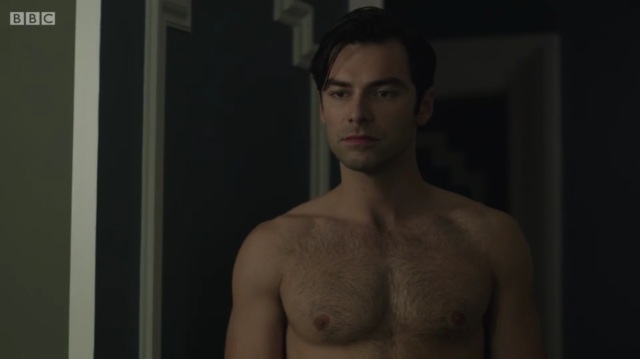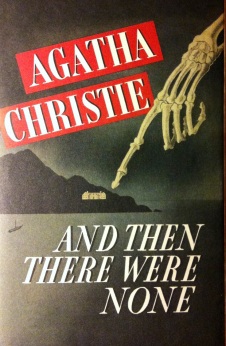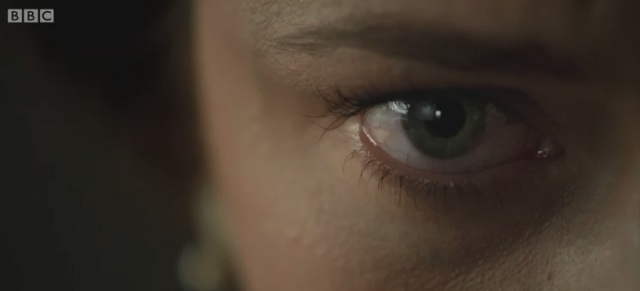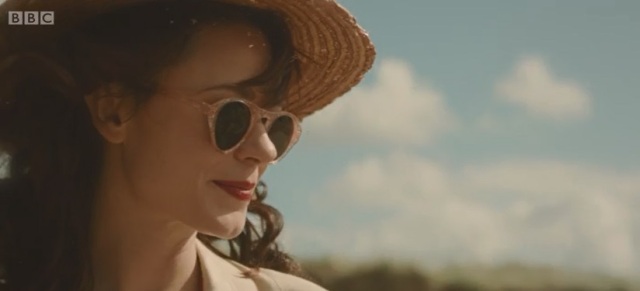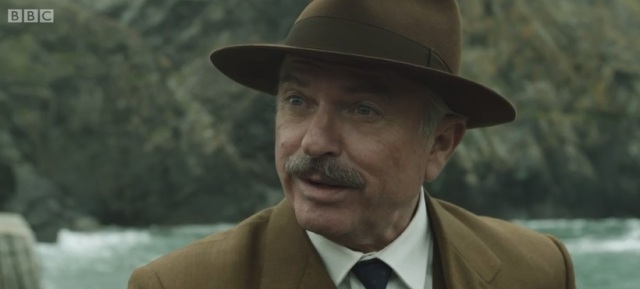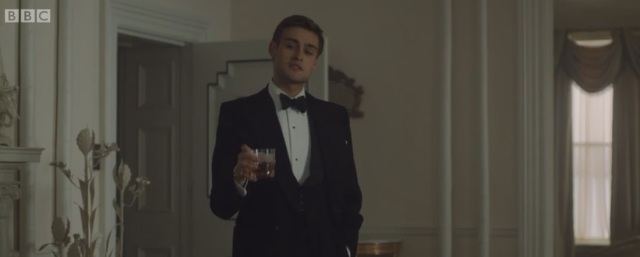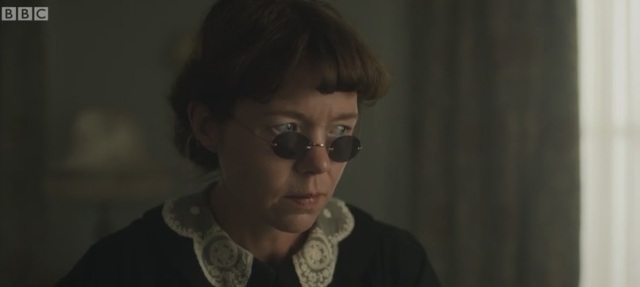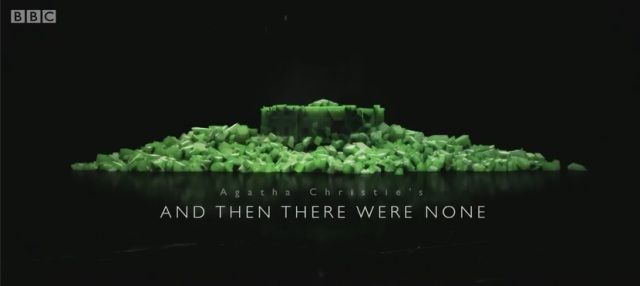
And Then There Were None
Adapted by Sarah Phelps for the BBC
First shown 27 December 2015
As the ‘Previously On’ teaser begins, we come back to Soldier Island as the victims do. We’re left in no doubt of the adaptation’s status as ‘thriller’: the sinister music, the quickly cut scenes, the final shot of death.
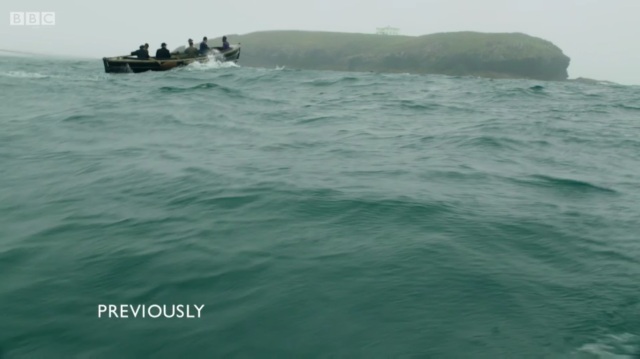
The adaptation in many ways brings out elements that in the book were under the
surface. To put it bluntly, everyone on television is a lot nastier. Armstrong’s sneering
dismissal of Vera is unpleasant to watch as he spits out the line:
“Miss Claythorne, I warned you against becoming hysterical”
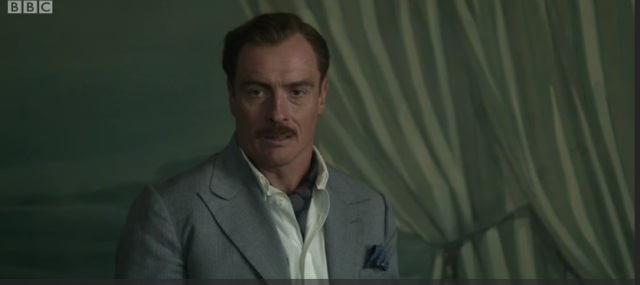
– but it’s utterly believable as extension of the weak, overly defensive character we see in the book.
This has good and bad aspects. It’s part of the medium that television forces interpretations onto the viewer, whereas reading the book we can make up our own minds.
“Rogers, did you take away any of these figures?” is a very simple line but can be anything in print: investigatory, quizzical, conversational, interrogatory, aggressive. On television, an actress can only play it one way – and the way chosen this time is near-panic. It’s a valid interpretation, but does make everything more black and white.
But there are good sides to this. The 20s attitude to women, the working class, is unspoken in the book. An adaption made in the 21st century lets us see quite how nasty this could be – worth remembering next time we snuggle up to a cosy rerun of Poirot.
“Who the hell do you think you are? I’m a doctor, and you’re just a secretary” snaps Armstrong. “It was dreadful news about Mrs Rogers,” Miss Brent says briskly to the recently widowed husband, “she was a wonderful cook”. Everyone looks on to injustice, and says nothing.
The bad side is that putting all of these extra interpretations into the mix, and making quite a lot of subtexts into text, only mostly works. For one thing, the removal of the shades of grey from many of the characters makes it difficult to get emotionally involved with the fate of anyone: they’re all so unappealing. Even General MacArthur, the most at ease with his fate and least malevolent, is still defined by his selfishness: he doesn’t mind death because he doesn’t have anything to live for. It never crosses his mind that whilst heis done with life, the same might not be true of the others, especially the far-younger Vera, Blore and Lombard. For another, both MacArthur’s and Lombard’s
treatment of Vera, the former patronising, the latter predatory, means that she starts the story already two steps away from hysteria. Tension has to slowly build or rise and fall. If it maintains the same pitch for too long the audience get bored.
Additionally, the sad fact is that both Rogers and Mrs Rogers aren’t very successful characters. Through them, we learn that it’s a cruel world and the cast are cruel people by the way the rich characters treat their social inferiors. It doesn’t leave very much room for
either Rogers or Mrs Rogers as people. Arguably there’s not much the adaptation could have done about this as they’re both offed pretty early on, but then the same could be said of Marston yet Douglas Booth crams a lot into about five minutes. It’s unfortunate that, after making some much of their lot as servants, they are ultimately in the adaptation only to serve a dramatic function.
And then we come to Miss Brent.
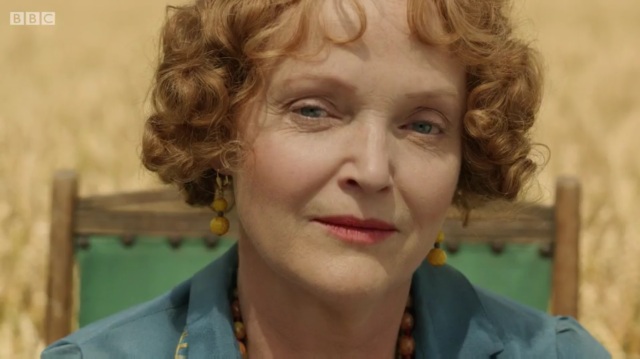
It’s been mentioned earlier that the original version of the character won’t wash here, simply because Miranda Richardson is far too attractive to play the character as written in the book. So instead we have to have a different motive. And the one we get is that she’s a repressed lesbian.
It’s not that it isn’t a valid interpretation, and it is good when adaptations do new things. It’s slightly disappointing that, for more than one character, what was a complex set of motives in Christie’s original boils down to ‘sex’ when adapted for TV.
This is also true for the Lombard and Vera story. And it was probably inevitable that Aiden Turner was going to take his top off at some point. The problem is that, as we’ve seen, the script has gone all this way to emphasise how the social barriers of class and gender remain in place despite everyone dying left right and centre. We see Rogers
making the breakfast after the death of his wife, then Vera being the one to deal
with lunch as the only woman left alive, and we’ve seen how the expectations are so built-in to this society that no-one for one moment questions this.
And then we also have Lombard wandering around shirtless in front of the ladies. Not that the character is really one to care, but you would expect someone to say something at this point because the rest of the characters have not yet broken down completely.
[An aside: Philip Lombard, let’s remember, is on the island because he killed a group of men, 21 in all. When Vera asks him about it, we get this exchange.
“Did you really kill all those men?” “Yes, Miss Claythorne, I did. And more.”
…and then he keeps going on about wanting to kill his host and make U N Owen number 22. Was he lying or can’t he count?]
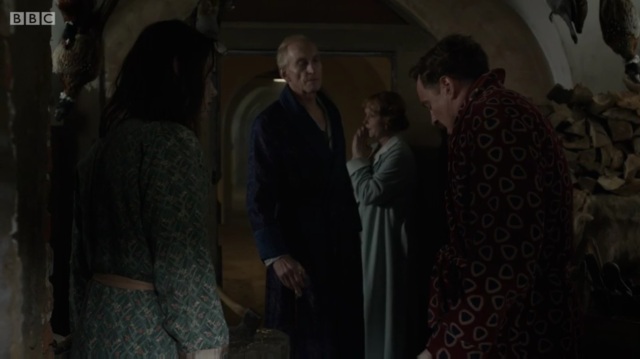
In a sort-of defence, the whole thing is not exactly sexed-up. Other than Lombard and
Marston, for whom it is in character, nobody looks good. Wargrave, Armstrong and MacArthur are nondescript, Vera is downright dowdy. We see characters greasy-haried, in dressing gowns. There is nothing sexy about watching a panic-stricken, half-naked Lombard realise that the gun has gone missing: it just shows us that he is in disarray both
emotionally and physically. And you would certainly not get the line ‘Now, let’s wash the guts off the stairs’ in Poirot.
So when, as the characters search all the bedrooms following the disappearance
of the gun, we get a Romantic Moment between a dressing-gown clad Vera and Lombard – who, slightly less explicably, still hasn’t put a shirt on – we can rest easy in the
knowledge that there’s definitely Dramatic Justification.
